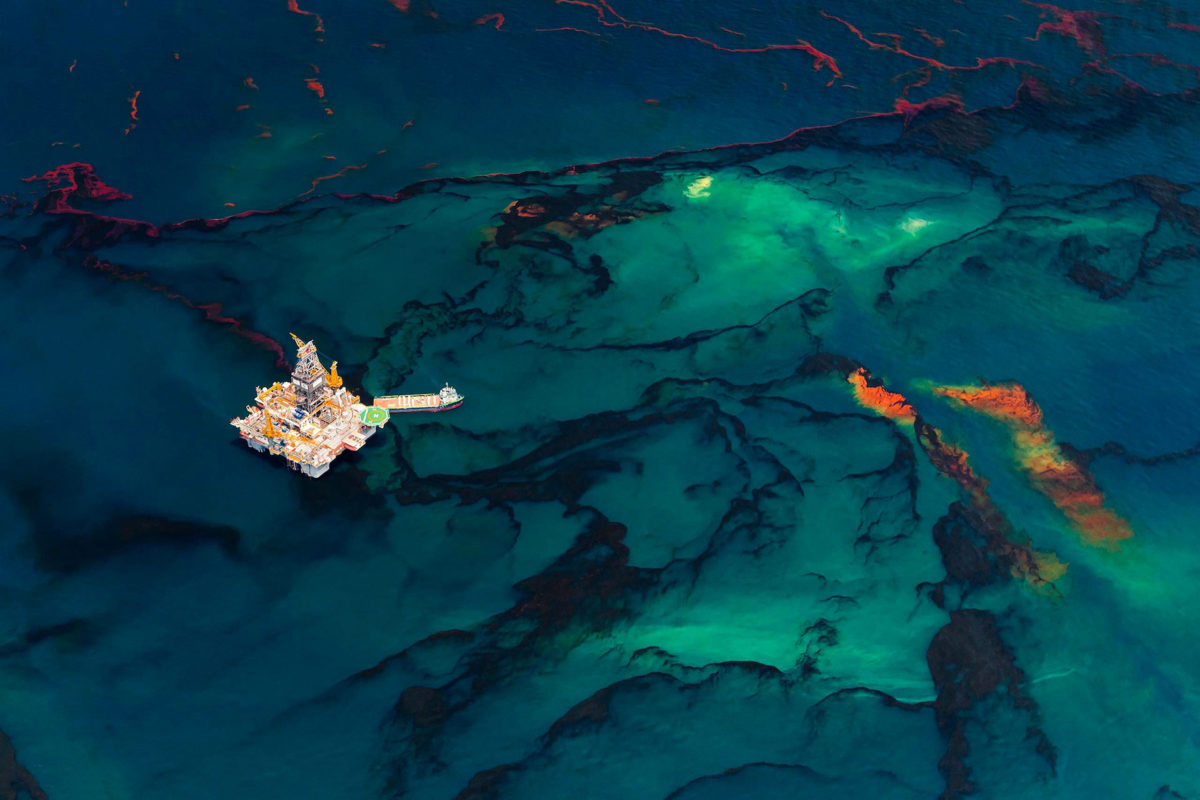The Great Australian Bight is home to 277 marine life species that are completely new to science: it also happens to hold the equivalent of 1.9 billion barrels of oil
An environmental documentary: Crude Expectations
In March 2019, a group of forty people paddled out on their surfboards, kayaks and stand-up paddle boards into the Pacific Ocean, in an Australian town called Byron Bay. The peaceful protest was organized in the wake of a Norwegian energy giant Equinor’s plans to drill a deepwater (2,239 m water depth) oil well 370 km offshore in the Great Australian Bight, one of most unique marine ecosystems in the world.
This paddle-out was tiny in comparison to the scale of ones that happened in the following months, seeing thousands of people paddle out in separate events across Victoria, South Australia, New South Wales and Western Australia. But for Alexandra Malanicheva, a 24-year-old filmmaker who organized the Byron Bay protest, it was a turning point that set her on the path to creating an environmental documentary, Crude Expectations.
Malanicheva grew up in Russia – a country well-known for its oil and gas production and a lack of transparency. Having moved to Australia to complete her Masters degree in Media Journalism, it was witnessing random people come together for a common cause, conceiving a documentary without a budget and a proper backing. «It felt like an army, a positive army. People shared how they would never want to see any animals or the ocean hurt», she said.
The Great Australian Bight marine environment
Located in South and Western Australia and is known as one the most pristine marine environments in the world. More than eighty percent of its known species are found nowhere else, and the region is home to marine resources and wildlife, including endangered species such as humpback, blue and southern right whales, southern bluefin tuna, Australian sea lions and an array of invertebrate ecosystems.
In recent years, research by The Great Australian Bight Research Program has been conducted in the area, finding 277 species that are completely new to science. It provides critical habitats and migration pathways, supporting a multi-billion dollar wild fisheries, tourism economy and aquaculture industries which sustain local indigenous and non-indigenous communities. The Great Australian Bight is also considered to be one of the most prospective under-explored oil and gas provinces in the world.
It is estimated that the Bight could hold the equivalent of 1.9 billion barrels of oil. It’s not just any oil that it’s abundant with – it’s the light sweet crude oil, considered the golden goose of the industry. The most sought-after type of petroleum: easier to refine or distill, and transport. At the same time, it’s these characteristics that makes it toxic, because if spilled, it spreads rapidly.
Lampoon reporting: The consequences of oil spills
What would actually happen if the oil spill occurred? In a risk assessment based on a hundred oil spill simulations, Equinor estimated a 4.3 million barrels of oil spilled in the worst case scenario. The consequences of a spill of that magnitude in the Bight could be catastrophic. It would become as the explosion of BP’s Deepwater Horizon rig in the Gulf of Mexico in 2010, which spread over 1,000 miles of shoreline, killed eleven people and had long-lasting effects on marine life.
Whilst the clean-up could be seen as efficient due to a quick response from the neighbouring infrastructures, the Bight doesn’ have any. If an accident in the Bight did happen, it would have a lethal impact on thousands of marine species, contaminating hundreds of kilometres of shoreline and damaging the productive nearshore kelp ecosystems of the Great Southern Reef. And it wouldn’t be notices straightaway. It could potentially spread into the ocean between Esperance in Western Australia, Sydney and Tasmania.
Although, one of the government’s arguments for the drilling was that it would bring a number of economic benefits to the region, the damage done as a result of a spill is a lot more considerable. It cost US$62bn for BP to deal with the aftermath of the Deepwater Horizon spill. It would affect commercial and recreational fisheries, as well tourism which will cause the coastal communities gigantic financial losses. Whilst the economy can eventually be rehabilitated, the wildlife cannot. Given the effects a spill could have, protections and strict laws are long overdue.
Protests against Equinor
After a number of demonstrations across the country where approximately ten thousand people protested against fossil fuel extraction in a marine wilderness area and a legal action threat, in February 2020 Equinor has announced a decision to pull out from the $200m deepwater drill project. A victory for the environment groups as well as the locals, however, Malanicheva says that the threat still remains.
Almost a third of the oil and a quarter of the natural gas consumed in the world come from underwater areas, and companies are still pursuing new exploration drilling locations. Equinor is the third major oil company to abandon plans to drill in the Bight. Before that there was BP in 2011 and Chevron – two oil giants who walked away after a public backlash. BP, being the one responsible for the Gulf of Mexico oil disaster, said in the official statement that «BP is a long-term, significant investor in Australia […] We expect to continue to consider further opportunities to invest and grow our business here».
Even though the plans got scrapped in these individual cases, there isn’t such a thing as international legislation when it comes to exploratory oil drilling and the Great Australian Bight is still up for grabs. «Companies can come to Australia, which doesn’t have a national minimum standards of safety and do whatever they want, without much responsibility. Ethically speaking, they should be responsible if something happens, but technically speaking, they’re not because it’s another country’s area» says Malanicheva. «They are going to the other side of the planet and risking an insane amount of marine animals and largely unexplored areas for their own economic benefit».
Unreliability and fluctuation of national legislation regulating offshore oil and gas activities
Some address only parts of the drilling lifecycle such as the production stage, others simply failing to control, monitor and implement the laws. An international agreement simply doesn’t exist, except the United Nations Convention on the Law of the Sea’s (UNCLOS) relevant provisions guidelines. There is little coordination or sharing of experience between different regions and countries involved in offshore drilling.
Equinor, formerly known as Statoil, has had near-catastrophic incidents in its Norway offshore operations in the past. All the spills occurred from its ocean rig called the Erik Raude. In 2007, 25,000 barrels (4,000 m3) of oil leaked into the North Sea. After which, two more leaks occurred and a drop of hazardous materials in the sea. It would be unfair to say that since then the company hasn’t done any damage control or changed their approach in any way. Prior to withdrawing from the Bight, they published a draft environment plan, outlining the response to risks associated with the project, including the possibility of a major spill, proclaiming ‘drilling can be done safely’.
This step towards transparency is commendable, however, it raises a question – is it worth it? As Malanicheva raises this subject in Crude Expectations, she asks «How many environmentally devastating disasters have to happen across the world for us to change our ways, for some legislation to come about? We don’t need more oil. We know we can’t afford to put more CO2 in the atmosphere».
The rise of renewable electricity: solar and wind power
Supported by Greenpeace and The Wilderness Society, Crude Expectation dives into the ethicality, as well as discussing whether we have a chance of not relying on oil and gas as much, if there’s a future with renewable energy. Although worldwide energy is responsible for two-thirds of greenhouse-gas emissions and fossil fuels are the ultimate source of 85 percent of energy, the current situation suggests that we are living through an oil slump, in the aftermath of Covid-19 hitting the global economy.
The demand for oil has decreased by more than by more than a fifth and the prices have collapsed. There is a future for renewable energy, all it requires is a bold action. And bold actions are increasingly influenced by public opinion. Concerns over climate change have already forced a number of big players to rethink costly energy projects – a Canadian mining giant Teck Resources scrapping its $20bn tar sands project, amongst others.
When researching for the documentary, Malanicheva realized how hidden and inaccessible legitimate information about the business of oil is «I was horrified to find out the amount of coal and oil Australia produces under the current government. Nobody knows it’s there, unless they have a specific interest in it. It’s a very underexposed situation, an under-covered issue, in the way that people will bother to read».
If the bold action is indeed taken, renewable electricity such as solar and wind power could rise from five percent of supply today to twenty-five percent in 2035, and nearly fifty percent by 2050. The shift towards electric vehicles, more environmentally-conscious company policies, green-infrastructure plans backed by politicians and a general wake-up call about climate change can and will bring us a step closer to eliminating devastating droughts, famine, floods and mass dislocation, as well as full-blown climate catastrophe.
Decarbonizing energy: a solution
Educating the masses by bringing forward expert opinions and young voices is the way forward, according to Malanicheva and her London-based co-producer Sara Antonova. «What we’re trying to do with the film is to dissect a very complicated system into more or less simple words with a case study of this specific issue, the Great Australian Bight. We are trying to explain in simple words what is happening and why, so that when people go out to hopefully take action they are equipped with information. Understanding the system is vital».
She highlights how integral it is to be politically active these days, to be aware of what’s going on in the governments, sustainability, whether in your own country or elsewhere. «We are trying to do justice to both sides of the conversation, or it can quickly turn into propaganda. I don’t feel like brainwashing people, guilt tripping them or pointing fingers.» Even though three international oil giants abandoned their plans to drill in the Bight, the government still hasn’t given the South Australian community certainty and permanent protection for the Great Australian Bight.
Three other companies also have interests in Bight exploration permits: Murphy Oil Corp., Santos Ltd. and Bight Petroleum Corp. Equinor also holds an exploration permit offshore Western Australia and said it would continue with other ongoing activities in the country. The government remains committed to encouraging ‘the safe’ development of Australia’s offshore petroleum resources. The Greens environment spokeswoman and a South Australian senator Sarah Hanson Young has proposed legislation that would put the Bight under world heritage protection.
Crude Expectations
Crude Expectations is a documentary on the reasonable expectations people can and should have about cutting our dependence on oil and gas.




















